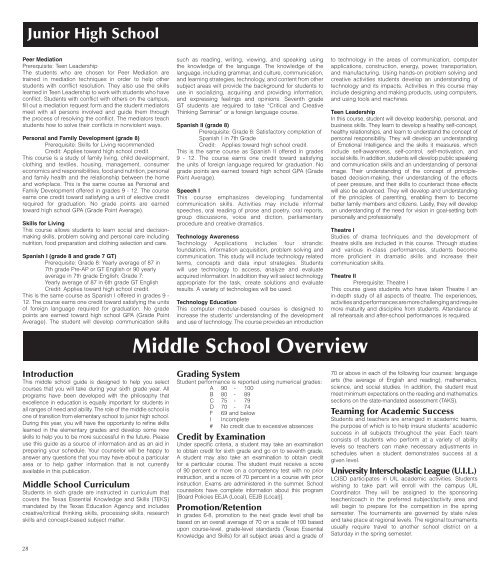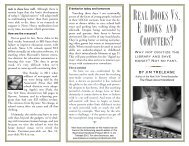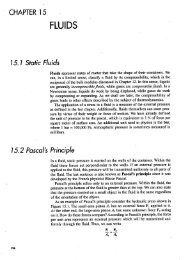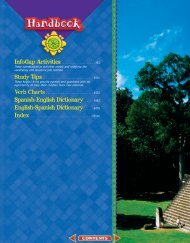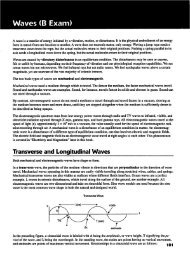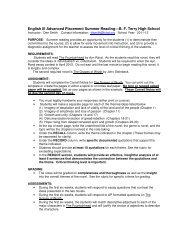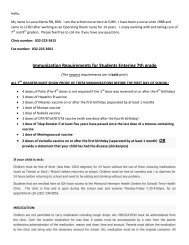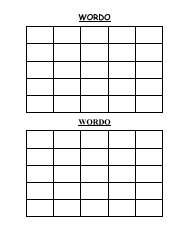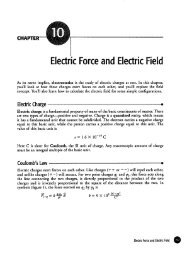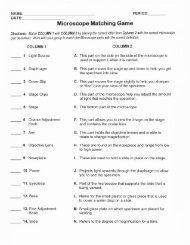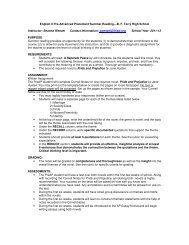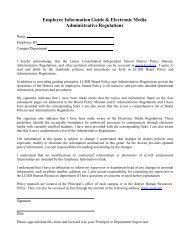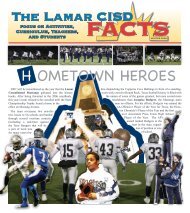Lamar CISD - District Information - Lamar Consolidated ISD
Lamar CISD - District Information - Lamar Consolidated ISD
Lamar CISD - District Information - Lamar Consolidated ISD
You also want an ePaper? Increase the reach of your titles
YUMPU automatically turns print PDFs into web optimized ePapers that Google loves.
Junior High School<br />
Peer Mediation<br />
Prerequisite: Teen Leadership<br />
The students who are chosen for Peer Mediation are<br />
trained in mediation techniques in order to help other<br />
students with conflict resolution. They also use the skills<br />
learned in Teen Leadership to work with students who have<br />
conflict. Students with conflict with others on the campus,<br />
fill out a mediation request form and the student mediators<br />
meet with all persons involved and guide them through<br />
the process of resolving the conflict. The mediators teach<br />
students how to solve their conflicts in nonviolent ways.<br />
Personal and Family Development (grade 8)<br />
Prerequisite: Skills for Living recommended<br />
Credit: Applies toward high school credit.<br />
This course is a study of family living, child development,<br />
clothing and textiles, housing, management, consumer<br />
economics and responsibilities, food and nutrition, personal<br />
and family health and the relationship between the home<br />
and workplace. This is the same course as Personal and<br />
Family Development offered in grades 9 - 12. The course<br />
earns one credit toward satisfying a unit of elective credit<br />
required for graduation. No grade points are earned<br />
toward high school GPA (Grade Point Average).<br />
Skills for Living<br />
This course allows students to learn social and decisionmaking<br />
skills, problem solving and personal care including<br />
nutrition, food preparation and clothing selection and care.<br />
Spanish I (grade 8 and grade 7 GT)<br />
Prerequisite: Grade 8: Yearly average of 87 in<br />
7th grade Pre-AP or GT English or 90 yearly<br />
average in 7th grade English; Grade 7:<br />
Yearly average of 87 in 6th grade GT English<br />
Credit: Applies toward high school credit.<br />
This is the same course as Spanish I offered in grades 9 -<br />
12. The course earns one credit toward satisfying the units<br />
of foreign language required for graduation. No grade<br />
points are earned toward high school GPA (Grade Point<br />
Average). The student will develop communication skills<br />
such as reading, writing, viewing, and speaking using<br />
the knowledge of the language. The knowledge of the<br />
language, including grammar, and culture, communication,<br />
and learning strategies, technology, and content from other<br />
subject areas will provide the background for students to<br />
use in socializing, acquiring and providing information,<br />
and expressing feelings and opinions. Seventh grade<br />
GT students are required to take “Critical and Creative<br />
Thinking Seminar” or a foreign language course.<br />
Spanish II (grade 8)<br />
Prerequisite: Grade 8: Satisfactory completion of<br />
Spanish I in 7th Grade<br />
Credit: Applies toward high school credit.<br />
This is the same course as Spanish II offered in grades<br />
9 - 12. The course earns one credit toward satisfying<br />
the units of foreign language required for graduation. No<br />
grade points are earned toward high school GPA (Grade<br />
Point Average).<br />
Speech I<br />
This course emphasizes developing fundamental<br />
communication skills. Activities may include informal<br />
speeches, oral reading of prose and poetry, oral reports,<br />
group discussions, voice and diction, parliamentary<br />
procedure and creative dramatics.<br />
Technology Awareness<br />
Technology Applications includes four strands:<br />
foundations, information acquisition, problem solving and<br />
communication. This study will include technology related<br />
terms, concepts and data input strategies. Students<br />
will use technology to access, analyze and evaluate<br />
acquired information. In addition they will select technology<br />
appropriate for the task, create solutions and evaluate<br />
results. A variety of technologies will be used.<br />
Technology Education<br />
This computer modular-based courses is designed to<br />
increase the students’ understanding of the development<br />
and use of technology. The course provides an introduction<br />
Middle School Overview<br />
to technology in the areas of communication, computer<br />
applications, construction, energy, power, transportation,<br />
and manufacturing. Using hands-on problem solving and<br />
creative activities students develop an understanding of<br />
technology and its impacts. Activities in this course may<br />
include designing and making products, using computers,<br />
and using tools and machines.<br />
Teen Leadership<br />
In this course, student will develop leadership, personal, and<br />
business skills. They learn to develop a healthy self-concept,<br />
healthy relationships, and learn to understand the concept of<br />
personal responsibility. They will develop an understanding<br />
of Emotional Intelligence and the skills it measures, which<br />
include self-awareness, self-control, self-motivation, and<br />
social skills. In addition, students will develop public speaking<br />
and communication skills and an understanding of personal<br />
image. Their understanding of the concept of principlebased<br />
decision-making, their understanding of the effects<br />
of peer pressure, and their skills to counteract those effects<br />
will also be advanced. They will develop and understanding<br />
of the principles of parenting, enabling them to become<br />
better family members and citizens. Lastly, they will develop<br />
an understanding of the need for vision in goal-setting both<br />
personally and professionally.<br />
Theatre I<br />
Studies of drama techniques and the development of<br />
theatre skills are included in this course. Through studies<br />
and various in-class performances, students become<br />
more proficient in dramatic skills and increase their<br />
communication skills.<br />
Theatre II<br />
Prerequisite: Theatre I<br />
This course gives students who have taken Theatre I an<br />
in-depth study of all aspects of theatre. The experiences,<br />
activities and performances are more challenging and require<br />
more maturity and discipline from students. Attendance at<br />
all rehearsals and after-school performances is required.<br />
Introduction<br />
This middle school guide is designed to help you select<br />
courses that you will take during your sixth grade year. All<br />
programs have been developed with the philosophy that<br />
excellence in education is equally important for students in<br />
all ranges of need and ability. The role of the middle school is<br />
one of transition from elementary school to junior high school.<br />
During this year, you will have the opportunity to refine skills<br />
learned in the elementary grades and develop some new<br />
skills to help you to be more successful in the future. Please<br />
use this guide as a source of information and as an aid in<br />
preparing your schedule. Your counselor will be happy to<br />
answer any questions that you may have about a particular<br />
area or to help gather information that is not currently<br />
available in this publication.<br />
Middle School Curriculum<br />
Students in sixth grade are instructed in curriculum that<br />
covers the Texas Essential Knowledge and Skills (TEKS)<br />
mandated by the Texas Education Agency and includes<br />
creative/critical thinking skills, processing skills, research<br />
skills and concept-based subject matter.<br />
28<br />
Grading System<br />
Student performance is reported using numerical grades:<br />
A 90 - 100<br />
B 80 - 89<br />
C 75 - 79<br />
D 70 - 74<br />
F 69 and below<br />
I Incomplete<br />
# No credit due to excessive absences<br />
Credit by Examination<br />
Under specific criteria, a student may take an examination<br />
to obtain credit for sixth grade and go on to seventh grade.<br />
A student may also take an examination to obtain credit<br />
for a particular course. The student must receive a score<br />
of 90 percent or more on a competency test with no prior<br />
instruction, and a score of 70 percent in a course with prior<br />
instruction. Exams are administered in the summer. School<br />
counselors have complete information about this program<br />
[Board Policies EEJA (Local), EEJB (Local)].<br />
Promotion/Retention<br />
In grades 6-8, promotion to the next grade level shall be<br />
based on an overall average of 70 on a scale of 100 based<br />
upon course-level, grade-level standards (Texas Essential<br />
Knowledge and Skills) for all subject areas and a grade of<br />
70 or above in each of the following four courses: language<br />
arts (the average of English and reading), mathematics,<br />
science, and social studies. In addition, the student must<br />
meet minimum expectations on the reading and mathematics<br />
sections on the state-mandated assessment (TAKS).<br />
Teaming for Academic Success<br />
Students and teachers are arranged in academic teams,<br />
the purpose of which is to help insure students’ academic<br />
success in all subjects throughout the year. Each team<br />
consists of students who perform at a variety of ability<br />
levels so teachers can make necessary adjustments in<br />
schedules when a student demonstrates success at a<br />
given level.<br />
University Interscholastic League (U.I.L.)<br />
L<strong>C<strong>ISD</strong></strong> participates in UIL academic activities. Students<br />
wishing to take part will enroll with the campus UIL<br />
Coordinator. They will be assigned to the sponsoring<br />
teacher/coach in the preferred subject/activity area and<br />
will begin to prepare for the competition in the spring<br />
semester. The tournaments are governed by state rules<br />
and take place at regional levels. The regional tournaments<br />
usually require travel to another school district on a<br />
Saturday in the spring semester.


